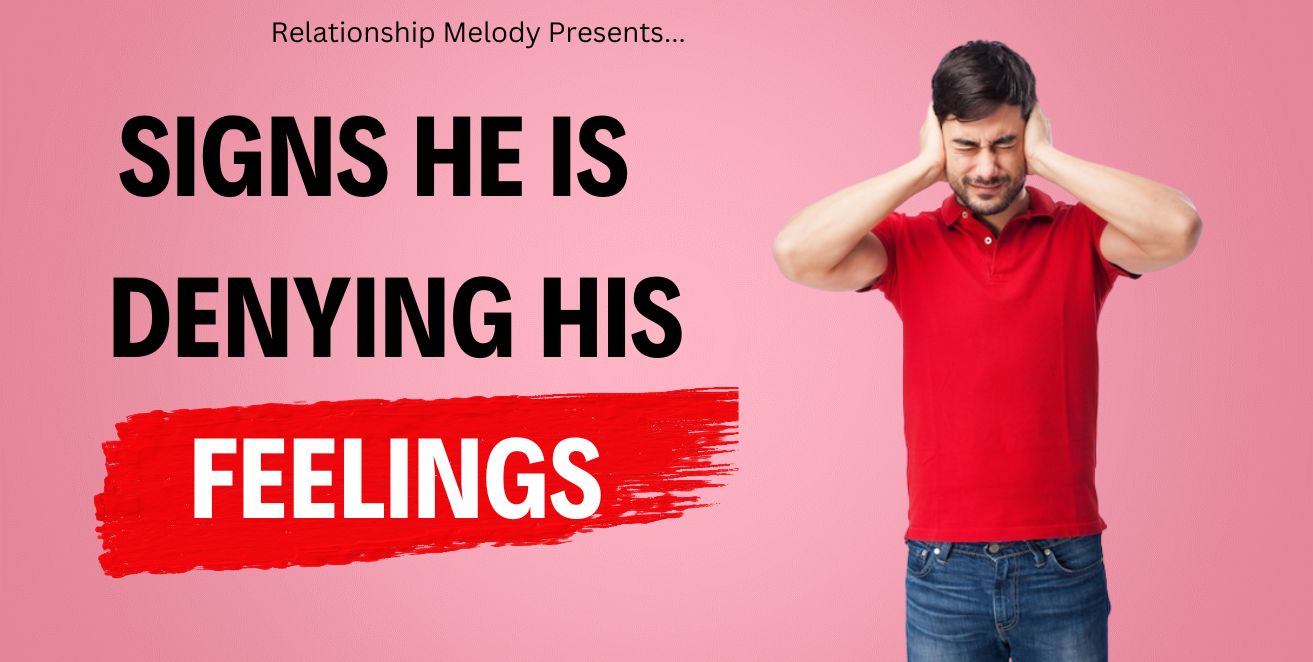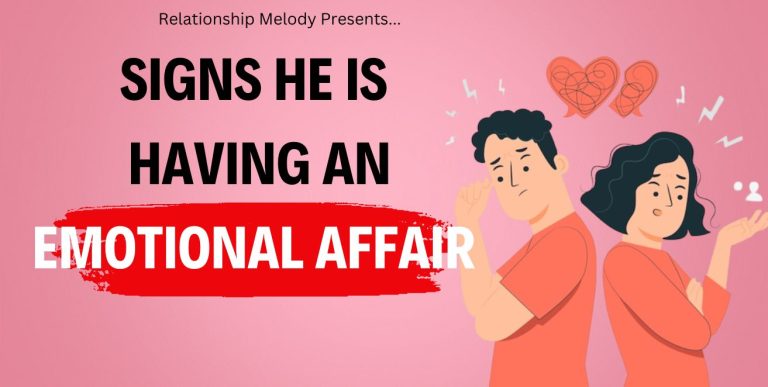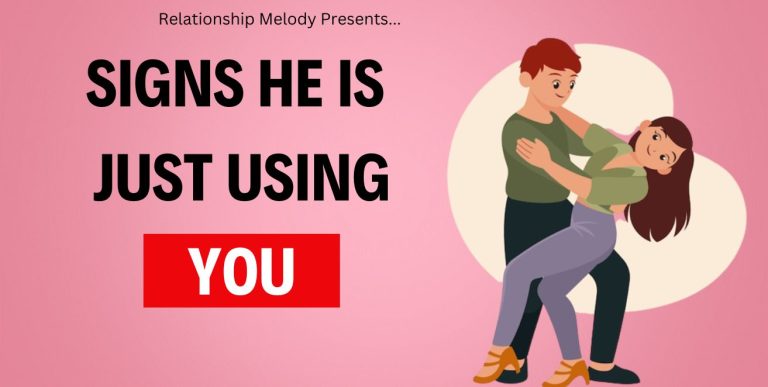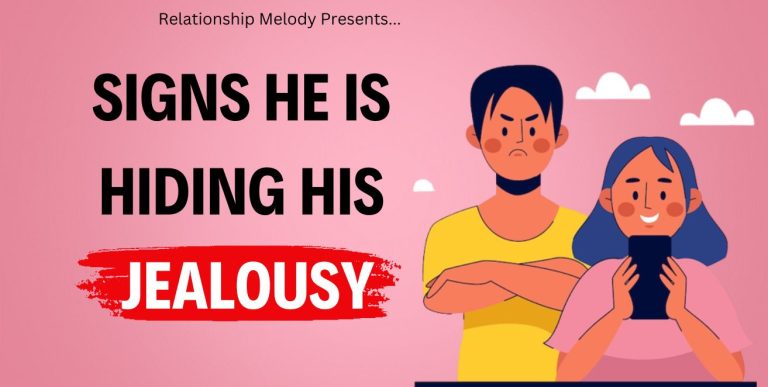25 Signs He Is Denying His Feelings
Understanding someone’s true feelings can be a challenging task, especially when they are denying their emotions.
It is not uncommon for individuals to struggle with acknowledging and expressing their feelings, often leading to confusion and frustration in relationships.
If you find yourself questioning whether your partner is denying their emotions, keep an eye out for these 25 telltale signs. Remember, recognizing these signs can help you navigate your relationship with better clarity and understanding.
25 Signs He Is Denying His Feelings
These are 25 signs to know.
#1 Excessive Defensiveness
One of the signs that he might be denying his feelings is excessive defensiveness. When confronted with emotional matters, he becomes overly defensive, deflecting and avoiding discussions.
This defensive behavior acts as a protective shield, preventing him from addressing his emotions honestly.
By diverting attention or downplaying the significance of emotional conversations, he can avoid the vulnerability associated with acknowledging his true feelings.
#2 Frequent Mood Swings
Unexplained and frequent mood swings can also indicate emotional denial. If your partner experiences drastic shifts in the mood without apparent reasons or refuses to acknowledge any underlying emotional triggers, it may signify an attempt to suppress or deny their true feelings.
These mood swings can range from sudden anger and irritability to withdrawal and silence, leaving you feeling confused and uncertain about what’s truly going on within their emotional landscape.
#3 Disinterest in Emotional Conversations
When he consistently shows disinterest or actively avoids engaging in emotional conversations, it could be a sign of emotional denial.
He may change the subject, become distracted, or dismiss the importance of discussing feelings altogether.
By evading such discussions, he maintains a façade of emotional detachment, choosing to bury his true emotions rather than confronting them head-on.
#4 Overemphasis on Logic
Another sign of emotional denial is an excessive reliance on logic while neglecting the emotional aspects of the relationship.
He may prioritize rationality over the emotional connection, often dismissing or diminishing the significance of feelings. This focus on logic can act as a defense mechanism, allowing him to avoid exploring and accepting his emotional vulnerabilities.
#5 Constant Need for Control
A strong need for control can indicate emotional denial. If your partner consistently seeks to control situations, conversations, or even your emotions, it may be a way for him to avoid confronting his feelings.
By exerting control, he creates a sense of emotional distance and shields himself from the discomfort of acknowledging and expressing his true emotions.
#6 Excessive Busyness or Workaholism
Engaging in excessive busyness or workaholic can be an escape from confronting suppressed emotions. If your partner constantly fills his schedule with work, hobbies, or other commitments, leaving little time for emotional connection, it could be a sign of emotional denial.
This constant busyness acts as a distraction, preventing him from delving into his feelings and the potential discomfort they may bring.
#7 Lack of Intimacy
A noticeable lack of intimacy, both physical and emotional, can indicate emotional denial. He may avoid or reject intimacy, offering various excuses or distancing himself when closeness is initiated.
By creating emotional and physical barriers, he shields himself from the vulnerability and intimacy that would require acknowledging and expressing his true emotions.
#8 Unwillingness to Compromise
A reluctance to compromise or an insistence on having things their way can be a sign of emotional denial.
He may exhibit an inflexible attitude towards finding common ground or dismiss the importance of considering your feelings and needs.
This behavior stems from a resistance to addressing and acknowledging his own emotions, as compromising may require delving into uncomfortable emotional territory.
#9 Frequent Distrust or Jealousy
Excessive distrust or jealousy can also indicate emotional denial. He may project his own unacknowledged emotions onto you, becoming overly suspicious or possessive.
By focusing on your actions and motivations, he deflects attention away from his emotional struggles and the potential feelings he is denying.
#10 Emotional Outbursts
Uncharacteristic emotional outbursts, such as anger, frustration, or even excessive crying, can signal emotional denial.
These outbursts often occur when emotions reach a tipping point, and he can no longer suppress them.
These sudden displays of emotions may confuse both of you, as they contradict the emotional denial he otherwise exhibits.
#11 Difficulty Expressing Vulnerability
If your partner struggles to express vulnerability or is hesitant to open up emotionally, it could be a sign of denying his feelings.
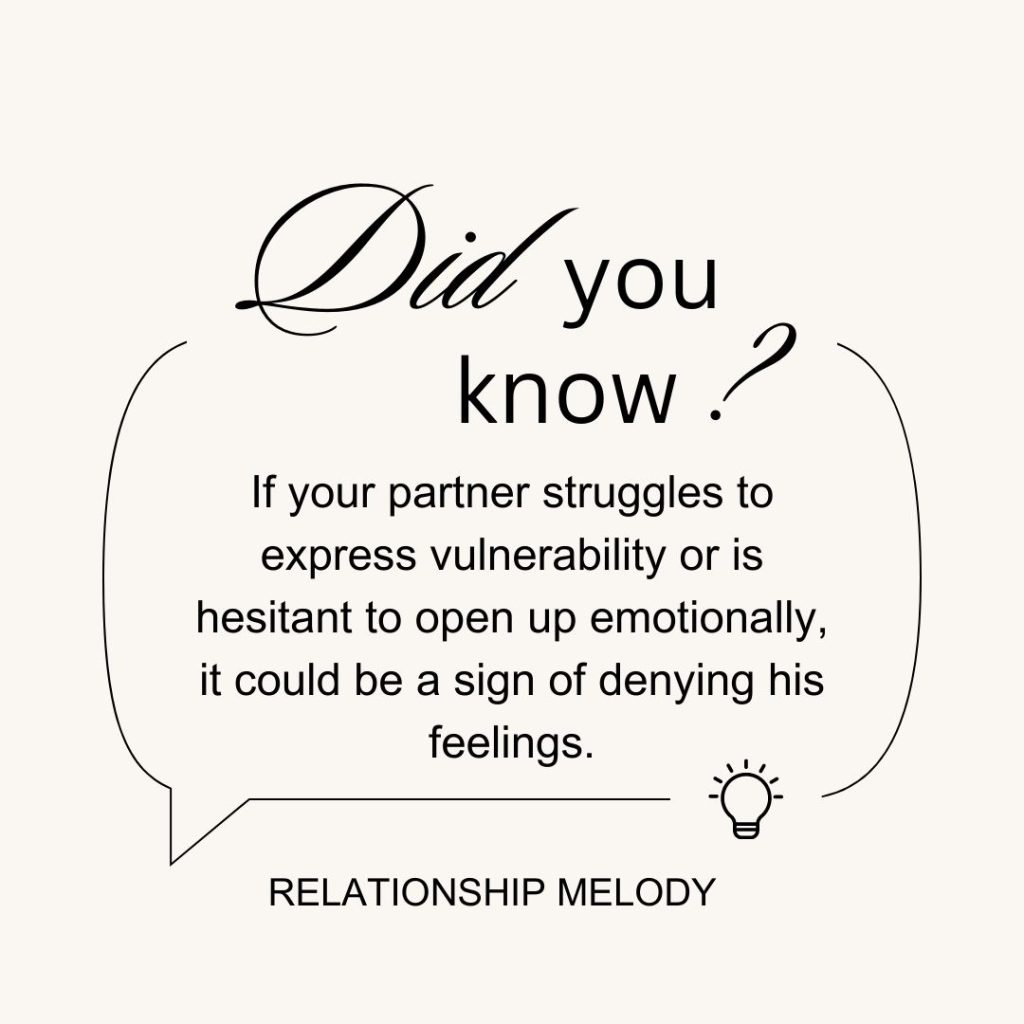
He may have a fear of being judged, rejected, or hurt, leading him to suppress his emotions. This difficulty in showing vulnerability prevents him from truly connecting on a deep emotional level.
#12 Avoidance of Personal Reflection
Emotional denial can manifest through avoidance of personal reflection. He may steer clear of introspection or avoid exploring his own emotions.
This can be seen as a defense mechanism, as delving into his feelings requires self-awareness and a willingness to confront uncomfortable truths.
#13 Inconsistent Verbal and Non-Verbal Cues
Mixed messages in the form of inconsistent verbal and non-verbal cues can be indicative of emotional denial. He may say one thing but display contradictory body language or behavior.
This inconsistency reveals a disconnect between his true feelings and what he outwardly expresses.
#14 Inability to Discuss Relationship Future
When he avoids discussing the future of your relationship or shows hesitancy in committing, it may be a sign of denying his feelings.
Addressing the future requires emotional investment and vulnerability. If he consistently evades these conversations or expresses uncertainty, it could be an indication that he is denying his deeper emotions.
#15 Reliance on Humor or Sarcasm
Using humour or sarcasm as a defence mechanism can be a sign of emotional denial. He may resort to making jokes or sarcastic comments to deflect from emotional conversations or difficult topics.
This behavior acts as a shield to prevent the deeper emotions from surfacing and keeps others at an emotional distance.
#16 Constant Need for External Validation
An excessive need for external validation can suggest emotional denial. If your partner constantly seeks validation from others, it may be an attempt to avoid confronting and acknowledging his own emotions.
By relying on external sources for validation, he can bypass the need to address his internal emotional landscape.
#17 Neglecting Self-Care
Neglect of self-care, such as poor hygiene, lack of exercise, or disregard for personal well-being, can indicate emotional denial.
When he fails to prioritize his self-care, it may be a reflection of internal turmoil and an unwillingness to address his emotional needs.
#18 Overcompensating with Material Possessions
Overcompensating with material possessions or extravagant gestures can be a sign of emotional denial. He may use gifts, expensive outings, or lavish gestures as a substitute for emotional intimacy and vulnerability.
This focus on materialism allows him to avoid addressing his true emotions and the challenges that come with genuine emotional connection.
#19 Subtle Non-Verbal Cues
Pay attention to subtle non-verbal cues that indicate emotional denial. These can include avoiding eye contact, fidgeting, or displaying tense body language when emotions are brought up. These cues reveal discomfort and an attempt to suppress or deny underlying feelings.
#20 Minimal Effort in Relationship Maintenance
If your partner consistently puts minimal effort into the relationship’s maintenance, it may signify emotional denial.
He may neglect communication, fail to engage in quality time together, or show disinterest in nurturing the emotional connection. This lack of effort suggests a reluctance to invest emotionally and confront deeper feelings.
#21 Escapist Behavior
Engaging in escapist behaviour, such as excessive gaming, substance abuse, or constantly seeking external distractions, can be a sign of emotional denial.
These behaviors serve as a means to avoid facing and processing emotions. By escaping into these activities, he can temporarily numb or ignore his true feelings.
#22 Difficulty in Expressing Empathy
If your partner struggles to express empathy or show genuine concern for your emotions, it may indicate emotional denial.
He may find it challenging to connect with and understand the emotional experiences of others, including your own. This difficulty stems from his struggle to acknowledge and process his feelings.
#23 Unresolved Past Trauma
Unresolved past trauma can contribute to emotional denial. If your partner has experienced significant emotional wounds or traumatic events, he may bury those emotions to protect himself from further pain.
The unresolved trauma prevents him from fully engaging with his present emotions and acknowledging his current feelings.
#24 Avoiding Introspective Questions
When he consistently avoids introspective questions or redirects the focus to external factors, it can be a sign of emotional denial.
Introspection requires self-reflection and a willingness to delve into one’s emotional landscape. By sidestepping these questions, he avoids confronting his true emotions and maintaining emotional distance.
#25 Fear of Rejection or Abandonment
A deep-rooted fear of rejection or abandonment can lead to emotional denial. If your partner is afraid of being vulnerable or expressing his emotions, he may deny them as a protective measure.
This fear stems from a desire to avoid potential emotional pain and maintain a sense of control over the relationship.
Learn more: 25 Signs He Is Crushing On You.
Conclusion:
Recognizing the signs of emotional denial in your partner is an important step in understanding the dynamics of your relationship. While it can be challenging to navigate the complexities of someone denying their feelings, awareness and open communication are key.
Remember, it’s essential to approach these discussions with empathy, patience, and a willingness to support your partner through their emotional journey.
Encourage your partner to explore their emotions in a safe and non-judgmental space. Professional guidance, such as couples therapy, can also be beneficial in helping both of you navigate and address the underlying emotional challenges.
Ultimately, emotional denial is a defence mechanism that can hinder the growth and authenticity of a relationship. By fostering a climate of emotional openness and trust, you can create an environment where both partners feel comfortable acknowledging and expressing their true feelings.
This will lay the foundation for a healthier and more fulfilling connection built on genuine emotional intimacy.
Liked Our Article?
Our Patreon link: https://www.patreon.com/RelationshipMelody

Welcome to Relationship Melody! Our website is dedicated to all things on relationships, dating, and love! We are passionate about helping you navigate the ups and downs of love, and our goal is to provide you with valuable insights and information that will make your journey toward a fulfilling relationship smoother and more enjoyable.

